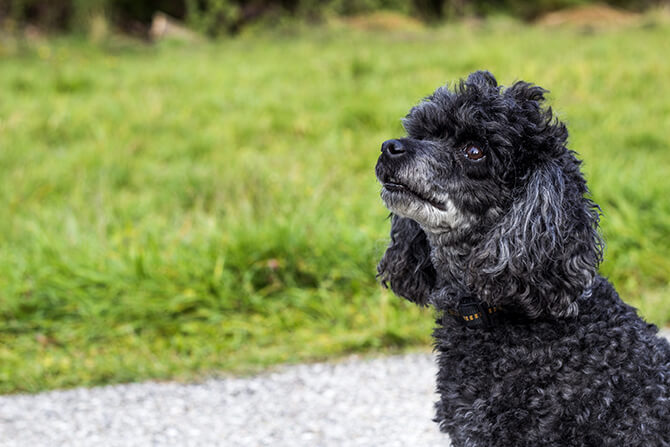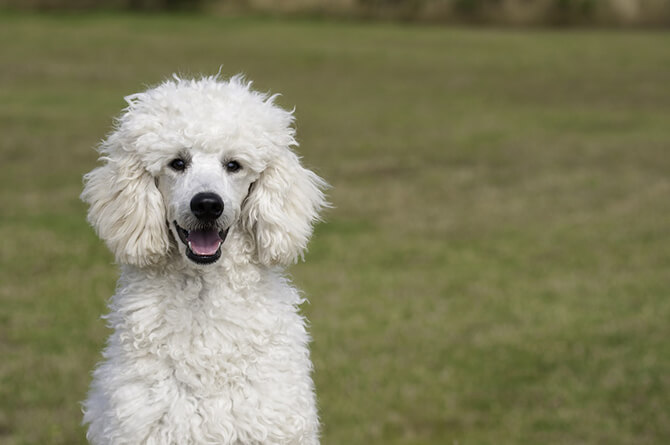
Toy poodles are exceptionally bright, sensitive, agile creatures. The most amenable to training of all the toy breeds, toy poodles often take top honors in obedience and agility shows. They don't react well to stress, which can make them literally sick to their stomachs, but are generally peaceful with other pets. If you've got a toy poodle, you've made a smart choice for training purposes: you've chosen a dog that's eager to learn and can seem almost telepathic in her ability to predict what you want.
Characteristics of the Poodle
If I were thinking about adopting and training a toy poodle, here are some basic facts that I'd want to be aware of before taking the plunge:
- Poodles can be pretty neurotic dogs - especially due to their widespread popularity, which has worked against them in the genetic material stakes. Puppy mills and ignorant backyard breeders churn out toy poodle pups by the dozen, which results in a lot of anxious, overly sensitive, snappy toy poodles. Be aware of the breed's tendency towards oversensitivity.
- Toys are, by nature, delicate and dainty creatures. This means no rough-housing; they aren't recommended for households with children, as kids can be unintentionally rough, which can result in an overwhelmed, snappy toy poodle.
- Toy poodle's high intelligence doesn't necessarily make them a great choice for the first-time owner. Very intelligent dogs like the poodle usually have low boredom thresholds, and they can get quite creative in finding new and exciting ways to make trouble. If you leave your toy poodle alone for long periods of time (for example, if you work outside the home), she will get bored very quickly - and will use the opportunity to wreak havoc in your house and garden. Don't be fooled by her small size, she can do a lot of damage!
Basic Training How-To's
- These really are very sensitive dogs, which means you have to be prepared for this when training. Your toy poodle will study your face and every move with an incredible attention to detail: if you seem angry or upset, she will know, and will become anxious and worried. Don't train if you're in a bad mood: keep it cheerful, gentle, and upbeat. Your toy poodle will respond eagerly to positive reinforcement training and praise for good behavior.
- Fortunately, these dogs are the easiest of all toy breeds to house train. Your toy should be trained in a matter of weeks - provided that you've stuck to the basic crate-training method (puppy or dog is in the crate at all times unless she's outside relieving herself, eating, or is actively being played with).
- I'd recommend that you get your toy poodle involved in obedience classes and, if possible, agility work (obstacle courses). These dogs have a tremendous appetite for learning difficult, complex tricks (balancing and 'thinking' tricks are taken to particularly well) and will welcome the challenge - it's also a great way to bond with your toy poodle.
- Try to keep stress to a minimum in your house. If there's regular fighting, angry and emotional people, or lots of stress, your toy poodle will sense it and will become ill or very upset herself. Poodles are calm dogs who need a calm environment to flourish in - if you don't want a neurotic, unhappy dog (with the resultant problematic behaviors) then try to keep it cool at home.
For more information on dog-training and handling behavior, as well as a plethora of how-to's for advanced training and obedience work (very handy for poodles!) take a look at Secrets to Dog Training: it's packed full of valuable information, straight from the mouth of an experienced dog-trainer.
Dog Obedience Advice is a free resource offering advice on dog training and a host of common problems dog owners face, including: aggression in all its forms, from territoriality to possessiveness, and from dominance aggression to aggression caused by fear; the most common and frustrating obedience issues, such as problem digging, chewing, and barking; and comprehensive information on house training methods with sound advice on tackling all of the most common housebreaking problems.
On the site you will find indepth articles and reviews of dog training products that we have researched and trialled. Dog Obedience Advice is run by Colin Pederson, a self-confessed "dog man" residing in California with his wife and black Lab Casey.


